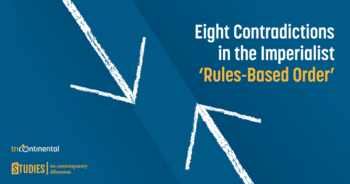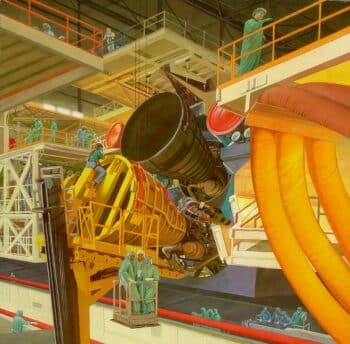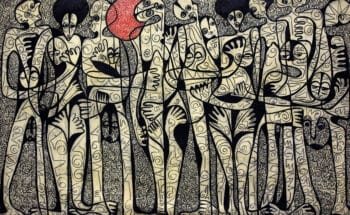Dear friends,
Greetings from the desk of Tricontinental: Institute for Social Research.
The Bulletin of the Atomic Scientists has now moved the Doomsday Clock to 90 seconds to midnight, the closest it has been to the symbolic time of the annihilation of humanity and the Earth since 1947. This is alarming, which is why leaders in the Global South have been making the case to halt the warmongering over Ukraine and against China. As Namibia’s Prime Minister Saara Kuugongelwa-Amadhila said, ‘We are promoting a peaceful resolution of that conflict so that the entire world and all the resources of the world can be focused on improving the conditions of people around the world instead of being spent on acquiring weapons, killing people, and actually creating hostilities’.
In line with the alarm from the Doomsday Clock and assertions from people such as Kuugongelwa-Amadhila, the rest of this newsletter features a new text called Eight Contradictions in the Imperialist ‘Rules-Based Order’ (which you can download as a PDF here). It was drafted by Kyeretwie Opoku (the convenor of the Socialist Movement of Ghana), Manuel Bertoldi (Patria Grande /Federación Rural para la producción y el arraigo), Deby Veneziale (senior fellow, Tricontinental: Institute for Social Research), and me, with inputs from senior political leaders and intellectuals from across the world. We are offering this text as an invitation to a dialogue. We hope that you will read, circulate, and discuss it.
 We are now entering a qualitatively new phase of world history. Significant global changes have emerged in the years since the Great Financial Crisis of 2008. This can be seen in a new phase of imperialism and changes in the particularities of eight contradictions.
We are now entering a qualitatively new phase of world history. Significant global changes have emerged in the years since the Great Financial Crisis of 2008. This can be seen in a new phase of imperialism and changes in the particularities of eight contradictions.
1. The contradiction between moribund imperialism and an emerging successful socialism led by China.
This contradiction has intensified because of the peaceful rise of socialism with Chinese characteristics. For the first time in 500 years, the Atlantic imperialist powers are confronted by a large, non-white economic power that can compete with them. This became clear in 2013 when China’s GDP in purchasing power parity (PPP) overtook that of the United States. China accomplished this in a much shorter period than the West, with a significantly larger population and without colonies, enslaving others, or military conquest. Whilst China stands for peaceful relations, the U.S. has become increasingly bellicose.
The U.S. has led the imperialist camp since World War II. Post-Angela Merkel and with the advent of the Ukraine military operation, the U.S. strategically subordinated dominant sections of the European and Japanese bourgeoisie. This has resulted in weakening intra-imperialist contradictions. The U.S. first permitted and then demanded that both Japan (the third-largest economy in the world) and Germany (the fourth-largest economy)—two fascist powers during World War II—greatly increase their military expenditure. The result has been the ending of Europe’s economic relationship with Russia, damage to the European economy, and economic and political benefits for the U.S. Despite the capitulation of most of Europe’s political elite to full U.S. subordination, some large sections of German capital are heavily dependent on trade with China, much more than on their U.S. counterparts. The U.S., however, is now pressuring Europe to downgrade its ties to China.
More importantly, China and the socialist camp now face an even more dangerous entity: the consolidated structure of the Triad (the United States, Europe, and Japan). The US’s growing internal social decay should not mask the near absolute unity of its political elite on foreign policy. We are witnessing the bourgeoisie placing its political and military interests over its short-term economic interests.

Maksud Mirmuhamedov (Tajikistan), Hearth, 2020.
The centre of the world economy is shifting, with Russia and the Global South (including China) now accounting for 65% of the world’s GDP (measured in PPP). From 1950 until the present, the U.S. share of the global GDP (in PPP) has fallen from 27% to 15%. The growth of the US’s GDP has also been declining for more than five decades and has now fallen to only around 2% per year. It has no large new markets in which to expand. The West suffers from an ongoing general crisis of capitalism as well as the consequences of the long-term tendency of the rate of profit to decline.
2. The contradiction between the ruling classes of the narrow band of imperialist G7 countries and the political and economic elite of capitalist countries in the Global South.
This relationship has undergone a major change from the heydays of the 1990s and the height of U.S. unilateral power and arrogance. Today, there are growing cracks in the alliance between the G7 and Global South power elites. Mukesh Ambani and Gautam Adani, India’s largest billionaires, need oil and coal from Russia. The far-right Modi-led government represents India’s monopoly bourgeoisie. Thus, the Indian foreign minister now makes occasional statements against U.S. hegemony in finance, sanctions, and other areas. The West does not have the economic and political ability to always provide what power elites in India, Saudi Arabia, and Turkey need. This contradiction, however, has not sharpened to the degree that it can be a focal point of other contradictions, unlike the contradiction between socialist China and the U.S.-led G7 bloc.

Zayasaikhan Sambuu (Mongolia), Survivors, 2013.
3. The contradiction between the broad urban and rural working class and sections of the lower petty bourgeoisie (collectively known as the popular classes) of the Global South versus the U.S.-led imperial power elite.
This contradiction is slowly becoming sharper. The West has a great soft power advantage in the Global South amongst all classes. Yet, for the first time in decades, young Africans have come out to support the expulsion of French troops in Mali and Burkina Faso in West Africa. For the first time, the popular classes in Colombia were able to elect a new government that rejected the country’s status as a vassal outpost of U.S. military and intelligence forces. Working-class women are at the forefront of many critical battles of both the working class and society at large. Young people are rising up against the environmental crimes of capitalism. Growing numbers of the working class are identifying their struggles for peace, development, and justice as explicitly anti-imperialist. They are now able to see through the lies of U.S. ‘human rights’ ideology, the destruction of the environment by Western energy and mining companies, and the violence of U.S. hybrid war and sanctions.
4. The contradiction between advanced rent-seeking finance capital versus the needs of the popular classes, and even some sections of capital in non-socialist countries, regarding the organisation of societies’ requirements for investment in industry, environmentally sustainable agriculture, employment, and development.

Owusu-Ankomah (Ghana), Bapende, 1993.
This contradiction is a result of the decline in the rate of profit and the difficulty of capital to increase the rate of exploitation of the working class to a sufficient level able to finance increasing investment requirements and remain competitive. Outside of the socialist camp, in almost all of the advanced capitalist countries and in most of the Global South—with some exceptions, especially in Asia—there is an investment crisis. New types of firms have arisen that include hedge funds such as Bridgewater Associates and private equity firms such as BlackRock. ‘Private markets’ controlled $9.8 trillion worth of assets in 2022. Derivatives, a form of fictitious and speculative capital, are now worth $18.3 trillion in ‘market’ value but have a $632 trillion notional value—a value more than five times higher than the world’s total actual GDP.
A new class of information technology-based network-effect monopolies, including Google, Facebook/Meta, and Amazon—all under full U.S. control—have emerged to attract monopoly rents. U.S. digital monopolies, under the direct supervision of U.S. intelligence agencies, control the information architecture of the whole world, outside of a few socialist and nationalist countries. These monopolies are the basis for the rapid expansion of U.S. soft power in the last 20 years. The military-industrial complex, the merchants of death, also attract growing investments.
This intensified speculative and monopoly rentier accumulation phase of capital is deepening a strike by capital against necessary social investments. South Africa and Brazil have seen dramatic levels of deindustrialisation under neoliberalism. Even advanced imperialist countries have ignored their own infrastructure, such as the electricity grid, bridges, and the railway. The global elite has engineered a tax strike by providing huge reductions in tax rates and taxes as well as legal tax havens for both individual capitalists and their corporations to increase their share of surplus value.

Taisia Korotkova (Russia), Technology, 2007.
Tax evasion by capital and the privatisation of large swathes of the public sector have decimated the availability of basic public goods like education, healthcare, and transportation for billions of people. It has contributed to Western capital’s ability to manipulate and gain high interest income from the ‘manufactured’ debt crisis facing the Global South. At its highest level, hedge fund profiteers like George Soros speculate and destroy the finance of entire countries.
The impact on the working class is severe, as their work has become increasingly precarious and permanent unemployment is destroying large sections of the world’s youth. A growing section of the population is superfluous under capitalism. Social inequality, misery, and desperation are abundant.
5. The contradiction between the popular classes of the Global South and their domestic political and economic power elites.
This manifests quite differently by country and region. In socialist and progressive countries, contradictions amongst the people are resolved in peaceful and varied ways. However, in several countries in the Global South where the capitalist elite has been fully in bed with Western capital, wealth is held by a small percentage of the population. There is widespread misery amongst the poorest people, and the capitalist development model is failing to serve the interests of the majority. Due to the history of neocolonialism and Western soft power, there is a decidedly pro-West middle-class consensus in most of the large Global South countries. This class hegemony of the local bourgeoisie and the upper stratum of the petty bourgeoisie is used to block the popular classes (who make up most of the population) from accessing power and influence.
6. The contradiction between U.S.-led imperialism versus nations strongly defending national sovereignty.
These nations fall into four main categories: socialist countries, progressive countries, other countries rejecting U.S. control, and the special case of Russia. The U.S. has created this antagonistic contradiction through hybrid warfare methods such as assassinations, invasions, NATO-led military aggression, sanctions, lawfare, trade war, and a now incessant propaganda war based on outright lies. Russia is in a special category, as it suffered more than 25 million deaths at the hands of European fascist invaders when it was a socialist country. Today, Russia—which notably has immense natural resources—is once again a target for complete annihilation as a state by NATO. Some elements of its socialist past are still present in the country, and there remains a high degree of patriotism. The US’s goal is to finish off what it started in 1992: at a minimum, to permanently destroy Russia’s nuclear military capacity and install a puppet regime in Moscow in order to dismember Russia in the long term and replace it with many smaller, permanently weakened vassal states of the West.

Victor Ehikhamenor (Nigeria), Lagos Hide and Seek, 2014.
7. The contradiction between the millions of discarded working-class poor in the Global North versus the bourgeoisie who dominate these countries.
These workers are showing some signs of rebellion against their economic and social conditions. However, the imperialist bourgeoisie is playing the white supremacist card to prevent a larger unity of working people in these countries. At this moment, workers are not consistently able to avoid falling prey to racist war propaganda. The number of people present at public events against imperialism has diminished precipitously over the last thirty years.
8. The contradiction between Western capitalism versus the planet and human life.
The inexorable path of this system is to destroy the planet and human life, threaten nuclear annihilation, and work against the needs of humanity to collectively reclaim the planet’s air, water, and land and stop the nuclear military madness of the United States. Capitalism rejects planning and peace. The Global South (including China) can help the world build and expand a ‘zone of peace’ and commit to living in harmony with nature.
With these changes in the political landscape, we are witnessing the rise of an informal front against the U.S.-dominated imperialist system. This front is constituted by the convergence of:
- Popular sentiment that this violent system is the main enemy of the people of the world.
- Popular desires for a more just, peaceful, and egalitarian world.
- The struggle of socialist or nationalist governments and political forces for their sovereignty.
- The desires of other Global South countries to reduce their dependence on this system.
The main forces against the U.S.-dominated imperialist system are the peoples of the world and the socialist and nationalist governments. However, there must be space provided for integrating governments that wish to reduce their dependency on the imperialist system.
The world currently stands at the beginning of a new era in which we will witness the end of the U.S. global empire. The neoliberal system is deteriorating under the weight of numerous internal contradictions, historical injustices, and economic unviability. Without a better alternative, the world will descend into even greater chaos. Our movements have revived hope that something other than this social torment is possible.
We hope that Eight Contradictions in the Imperialist ‘Rules-Based Order’ will stimulate debate and discussion and assist us in our broader Battle of Ideas against toxic social philosophies that seek to suffocate rational thought about our world.
Warmly,
Vijay

